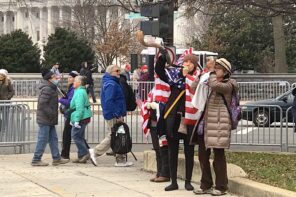If the adage is correct that “nationalism is an extension of egoism” then national “unity” may be nationalism’s superego.
Of late there has emerged a cottage industry regarding Jewish unity. The reason is obvious; Jewish unity is in a state of disrepair. As Steven Cohen and Jack Werthheimer noted in a 2006 essay in Commentary Magazine, the last time Jews as a collective body were unified was around The Movement for Soviet Jewry in the 1970s. They posit that given the map of Jewish opinion today, save some catastrophic event, there is nothing that can galvanize Jewish unity again. Not even Israel.

Trouble in the Tribe: The American Jewish Conflict over Israel
Dov Waxman
Princeton University Press
April 12, 2016
The nation-state of Israel is a fact. But Waxman argues that it also has become the touchstone of this disunity which is, in some ways, quite new. Decades earlier Charles Liebman made the claim that, “Israel has become instrumental to one’s American Jewish identity. Israel, and concern for Israel, are preeminently a symbol of Jewish identity.” Arthur Hertzberg, author of the seminal book, The Zionist Idea, went as far as calling supporting Israel a “substitute religion” for American Jews.
This was not only true of people on the center-right. In the late 1960s and early 1970s “The Radical Zionist Alliance,” which included many young Jews on the left, made a similar equation. One of its founders, Chava Katz, wrote in 1970, “To talk about being pro- or anti-Israel is like saying, ‘Are you pro or against yourself?’”
In the course of just a few decades a major transformation has taken place. As Waxman notes, “The era of ‘Israel, right or wrong’ is over. Nowadays, American Jewish support for Israel is much more complicated.” Progressive groups such as J-Street or Jewish Voice for Peace, who are openly critical of Israel (and in the case of JVP, support BDS), have caught the attention of many Millennial Jews who have no historical memory of Israel before 1967, no sentimentalism for an Israel that “made the desert bloom,” feel no nostalgia for the score of Otto Preminger’s 1960 film Exodus.
Unity is about fanaticism and hysteria
Today the identification of Israel with Jewishness takes many forms, spoken and unspoken, supportive and critical. In a recent panel at the “Wrestling with Jewish Peoplehood” conference in Philadelphia, Peter Beinart made the important point that young Jews who are openly critical of Israel, even some who support BDS, are doing so not against Israel per se but as an exercise of engagement with Israel. The negative response from the ostensible “pro-Israel” camp illustrates that they do not simply want American Jews to be engaged with Israel, they want them to be engaged in a very specific way.
When they are not, they become guilty of Jewish self-hatred or aiding and abetting anti-Semitism. They become guilty of disunity, which only illustrates that unity is really about policing boundaries more than collective cohesion. Unity itself becomes an expression of egoism. In her 1948 essay “To Save the Jewish Homeland,” Hannah Arendt lashes out against unanimity:
A unanimous public opinion tends to eliminate bodily those who differ, for mass unanimity is the not the result of agreement, but an expression of fanaticism and hysteria. In contrast to agreement, unanimity does not stop at certain well-defined objects, but spreads like an infection into every related issue.
While unanimity and unity are certainly not identical, in many circles the terms have become blurred. On some issues American Jewry still applauds pluralism, but there’s a covert, and sometimes overt, demand for consensus, or unanimity when it comes to Israel.
This “engaged critique” by many Jewish groups on the left has evoked harsh responses from the Jewish establishment, responses that often draw a correlation between the state of Israel and “Jews” more generally, suggesting that a critique of the former amounts to delegitimizing the latter. For example, Israeli Ambassador Ron Dermer said, of gift packages comprised of products manufactured in Israeli settlements, “This year I decided to send a gift for the holiday that would also help combat BDS.”
Defending his gift Dermer continued,
regardless of why they support BDS, the fanatics and fools are simply promoting a new anti-Semitism. Once Jews were singled out and held to a different standard than other peoples. Today, the Jewish State is singled out and held to a difference standard than other countries. [Emphasis added.]
This is an interesting claim. The unjustified singling out of Jews which has been emblematic of anti-Semitism historically is now transferred to an entire nation-state whose exercise of power (whatever one thinks of the occupation, it is certainly an exercise in power) is now often rendered as a self-defensive act on the part of the victimized, not unlike the Jews who suffered persecution throughout history. For Dermer, to criticize Israel, including the occupation, amounts to blaming Jews for their persecuted state historically. To be critical of Israel is to be anti-Israel and to be anti-Israel is ostensibly to be anti-Semitic.
On this reading, the state of Israel has not solved the problem of the exilic Jew (anti-Semitism), but simply transposed the problem to the nation-state. Israel’s retention of the Jews’ victimized status by equating a disempowered people with an empowered nation-state illustrates the failure of Zionism to achieve the normalization many of its founders hoped for. Part of this is certainly due to Israel’s contested regional status but part may also be due to Israel’s continued traumatized state which, while understandable, is also detrimental to the continued flourishing of Jews and Judaism worldwide.
Comments made by some Israeli politicians (e.g. Netanyahu on Iran or BDS) suggesting that Israel, or perhaps the Jews, live in a perpetual state of 1938, only perpetuate a state of trauma that is used to excuse otherwise problematic behavior. This is not to deny that some anti-Zionism is indeed veiled anti-Semitism—it surely is—it’s only to contest Dermer’s implication that is so by definition. (This point is developed in perhaps a more nuanced way by Judith Butler in her reading of Lawrence Summers in her Precarious Life.)
Jewish unity is often posed as a solution to, or shield against, the problem of anti-Semitism but it’s more often an attempt to erase dissent. Waxman shows that on the question of Israel, this tack has failed miserably in contemporary American Jewry. More pointedly, he shows that the very notion of Jewish unity, even in regards to Israel, is a myth:
Contrary to popular belief, and nostalgic memory, that once upon a time American Jews all agreed about Israel…the historical record is, in fact replete with examples of American Jewish disagreements about matters concerning Israel.
We can point to the anti-Zionist American Council for Judaism; the non-statist American Zionists, such as rabbis Abba Hillel Silver and Stephen Wise (who only agreed to join Ben-Gurion’s statist project after the Biltmore Conference in May, 1942); and the anti-occupation group Breira that emerged after the Yom Kippur War in 1973; among many others.
The new heresy
The identification of Zionism with Jewishness that, as Waxman shows, is being resisted today, has a history that is far too complex to summarize here. One could argue it reaches back at least to David Ben Gurion and the articulation of “negation of the Diaspora,” the notion that the safety of the Jews—the very survival of the Jews—is dependent on a Jewish nation-state. Thus, to criticize the nation-state—even without fully delegitimizing it—can be construed as an expression of anti-Semitism, “in effect if not intent,” because it is an act that threatens not only the nation-state but the entire Jewish people.
For those who advocate this position, a Zionism-Judaism equation that constitutes a kind of doctrinal negation of the Diaspora (since many of its adherents live in the Diaspora!), the works of Daniel and Jonathan Boyarin and Judith Butler are viewed as modern forms of heresy precisely because they undermine the very equation that serves as the cornerstone of the identity of many American Jews.
In more “theological” times, heresy was that which undermined God’s covenant with Israel; for example, questioning that “Torah is from Heaven,” divine providence, or other doctrinal principles. In today’s more identarian times, heresy is that which ostensibly undermines Jewish survival, which is often defined as dependent on Jewish unity. And if Jewish survival is inextricably tied to Israel, then questioning or criticizing Israel is threatening Jewish survival. Heresy is thus Jewish collusion with anything that can be construed as anti-Semitism, even if its not.
Today, heresy is that which threatens Jewish physical survival. This is not new. It was pointed out by Arthur Hertzberg in 1979:
One can no longer be excommunicated in Modern America for not believing in God, for living totally outside the tradition, or even for marrying out. Instead, a new heresy has now emerged to mark the boundaries of legitimate Jewish identity, the heresy of opposition to Israel and Zionism.
On this reading, “Judaism-Zionism” has thus become a kind of post-Holocaust civil religion, a crass way of understanding Emil Fackenheim’s 614th commandment (“not to give Hitler posthumous victories”); not in addition to the other 613, but too often in place of them.
What’s really going on here is more complex than the struggle for, or against, unity; or even pro- vs. anti-Israel positions. In fact, as Waxman notes, it may not be about Israel at all:
The debate, in other words, is not only about what Israel should do and what kind of state it should be, but also, and perhaps more fundamentally, about who American Jews are, what their community stands for, and what its purpose should be.
One way of coming to terms with the accusation of anti-Semitism as a reaction to anti-Israelism or anti-Zionism—or even an engaged critique of Israel—is to see it as an example of “cultural shorthand”; saying one thing while meaning another.
As an example, take the case of intermarriage. Exogamy is one of the most talked about issues in contemporary American Jewry. When the recent 2013 Pew Poll found that among non-Orthodox American Jews almost 70% intermarry (when we include Orthodox Jews it is about 58%) American Jewish institutions have been pouring resources in trying to understand the phenomenon and discuss its implications. One very thoughtful contribution is Jennifer Thompson’s recent book Jewish on Their Own Terms: How Intermarried Couples are Changing American Judaism. An ethnographer by training Thompson explores what she calls “thinking with intermarriage” as opposed to viewing it as a “problem” or “crisis” that requires a solution (the solution being diminishing intermarriage). Discussing a series of articles that focus on the “crisis” of intermarriage and the responsibility of Jewish social networks, Thompson writes,
Yet in the discussion of social networks, the term intermarriage does not simply mean ‘couples that include one non-Jewish spouse’. It means ‘couples who are assimilated’ – that is, those who are disconnected from Jewish communities, organizations, and practices. In this cultural shorthand, not all assimilated Jews are intermarried, but all intermarried Jews are assimilated.
She argues that when American Jews talk about intermarriage they are really talking about assimilation.
This notion of “cultural shorthand,” talking about one thing while really talking about something else (and knowing the reader can fill in the blank space in-between) is a common way communities struggle to come to terms with things they have less control over by talking about things that they ostensibly have more control over. The fear of intermarriage for many American Jews may really be a fear of assimilation, but assimilation is such a deeply rooted dimension of the American Jewish experience, so difficult to locate, much less control, and such an integral part of Jewish success in America, that intermarriage, something even many assimilated Jews fear, is an easier way to attract attention.
So, when some accuse Jewish supporters of BDS (or even of an end to the occupation and the evacuation of most settlements) of being self-hating Jews, or of abetting anti-Semites, it may really be an exercise in cultural shorthand for the unraveling of the Zionist-Judaism fusion, or at least the lack of an ability to police it. On this reading, these progressive Jews are only “anti-Semites” within the hegemonic Zionist-Judaism orbit.
That is, if Zionism (which is often really not much more than “pro-Israelism” or Israel advocacy as an identarian act) is identical to Jewishness, then challenging Zionism is an attempt to undermine the Jews. Ergo, anti-Semitism. The accusation of anti-Semitism as a policing tool to discredit these Jewish progressives may be a desperate effort to maintain the Zionism-Judaism identification without which Jews would have to construct new forms of identity.
In a manner of speaking, then, it has less to do with a fear of what will happen to Israel than of what will happen to American Jews when support of Israel is no longer an operative civil dogma. When new forms of diasporic identities are posited, they are quickly deemed illegitimate precisely because Israel has become a substitute for Torah (or other forms of Jewish identity)—especially for Jews who don’t live there.
Today American Jews are facing a series of interlocking problems and challenges that include but also exceed any external threat to their existence or the existence of the state of Israel. The fear that love and support of Israel that held Jews together for the past decades is unraveling has given rise to the misuse, and sometimes irresponsible, accusation of anti-Semitism.
What Judaism, especially in America, might look like if legitimate Jewish identity were severed from supporting Israel has been the subject of continued study from the 1980s until today. Waxman shows us that Israel will continue to play an important, but not exclusive, role in that new self-fashioning. But Israel will include—already includes—dissent against its present configuration. The notion that dissenting groups are self-hating by definition is the product of a post-Holocaust mentality that is disappearing, though it still wields considerable influence.
Dissenting views on Israel in the American Jewish past have largely been erased from historical memory, with new manifestations unaware that they too are continuing a tradition. If American Jews can overcome the notion that unity is essential, on any matter, it might be able to have a more nuanced conversation about boundaries. Cohen and Wertheimer may be right that today there is almost nothing that can unify the Jews. Whereas some see that as a cause for lamentation, others see it is as a blessing in disguise.
_____
* This notion is actually quite recent. In the early 1970s Norman Podhoretz wrote an essay in Commentary—“We are all Zionists Now!”—that captured the way 1967 was a watershed for American Jewish attitudes toward Israel. Before that, Israel was not a central part of American Jewish identity except for those committed Zionists. While today, for supporters of AIPAC on the right and some Jewish supporters of BDS on the left, Israel is a central tenet of their identity, it is a more complicated story given the last almost half century of Jewish life in America.
Correction: In an earlier version of this article, an important reference to the work of Jennifer Thompson was inadvertently excised . We regret the error. –Eds.





